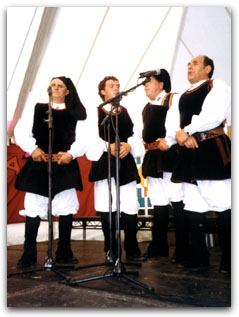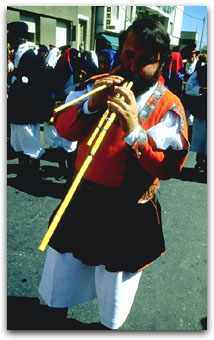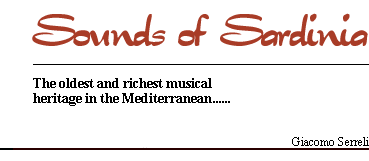It is difficult to find a musical heritage
so varied and full of expression as the one you can find in Sardinia, which is a small island of just
under 24 thousands sq. km with a population of 1 million 600 thousands inhabitants.
|
Sardinian traditional music is in
every sense one of the richest and oldest in the Mediterranean. The expression of this heritage
can be found in polyvocal or monodic songs and in the use of instruments, some of which are
typical of the island.
Undoubtedly one of the most original forms in the island's polyvocal heritage is the CANTO
A TENORES (Tenors song).
It is a choral song sung only by four male voices and it is typical of Barbagia, an area in the
centre of Sardinia.
The leading voice, called the "boghe", (which means 'voice' in the Sardinian language), sings
the basic musical motif of lines of poetry which are the main source of the "repertoire" and
which comply with the various metrics. The other voices are the "bassu" which has the same
tonality as the solo voice with a very deep and nasal tune distinguishing it from "sa contra",
and "sa mesa oghe" which have a high timbre.
|
|

 Choir "Remunnu e Locu" from Bitti Choir "Remunnu e Locu" from Bitti |

 Peppe Cuga Peppe Cuga |
|
These three voices, also often with
the inclusion of the solo voice, take part in the song soon after "sa oghe" with a very rhythmic
form stressing syllables without sense and which can be different depending on the villages
they are from (bim-ba-rim, bim-bo-ba-ri-là). Starting from these features Andrea Deplano, author
of a extensive study of the "tenor", identified five different areas for this song, whose origin are
still unknown.
Perhaps its origin dates back to the primeval vocal production of the people living in the centre
of Sardinia. In fact due to the mountainous terrain of that area the men were often forced to lead
a lonely life as shepherds as they had to spend long periods away from their families.
In order to sing this song the shepherds had to meet and its peculiar expression probably
referred to kind of life they had to live in the country.
|
|



